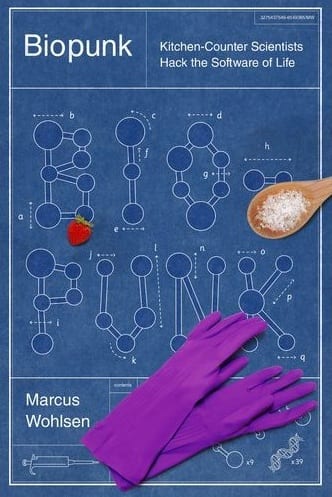
Marcus Wohlsen is on to something.
An Associated Press science and biotechnology writer, Wohlsen is the author of the book BioPunk: DIY Scientists Hack the Software of Life.
The book, which came out in April, outlines the parallels between the current community of upstart amateur scientists working in makeshift kitchen labs and garages with the early years of the personal computer and the birth of the dotcom industry.
The conceit of the book is that just as Steve Jobs and Steve Wozniak – geeked-out members of the Homebrew Computer Club – could assemble off-the-shelf components in a garage in Cupertino and launch Apple Computers, some tattooed punk scientists may soon unveil a new biotechnology breakthrough at Maker Faire.
Well, maybe.
There is no doubt that the tools needed to make big leaps in innovation in biotechnology are more readily available to the Everyman, or Everywoman.
This has happened in an area that is progressing like Moore’s law on steroids, where instead of computer chips doubling their processing power every two years, genome sequencers are doubling in performance every six months.
It’s actually a weakness of the book that in some sections it already appears dated. There are a few pages that mention 23andMe and other direct-to-consumer genetics companies that feel like an old newspaper clipping. A book review by Daniel Grushkin nailed the point home by saying that Wohlsen finished his reporting too soon.
But that rapid change and progress is part of what has enthralled many enthusiasts in the movement, when it feels as if mankind is on the verge of a major leap forward in understanding the basic code of life.
It’s here that Wohlsen’s book is especially powerful. He has captured a moment and tapped into the energy of a truly driven tribe of citizen scientists.
Wohlsen uses a grab bag of characters as diverse as Kay Aull, a MIT graduate in bioengineering, who developed a procedure in her apartment that diagnosed her dad’s hemochromatosis.
Then there’s Tito Jankowski and Josh Perfetto, two guys who built a cheap kit for a polymerase chain reaction (PCR). PCR amplifies DNA for sequencing and is one of the most useful instruments for molecular biology. Wohlson spends some time with Eri Gentry and John Schloendorn, who studied cancer cells in their kitchen. Gentry formed the non-profit BioCurious, a sort of co-op lab space set to open in Mountain View. The two also have their hands in several other endeavors involved in pharmaceuticals, health and personal genetics.
While all these people are working outside traditional labs, in most cases they also come from traditional science backgrounds. They began to dabble outside the those confines because they were stymied in some ways from doing what they want. In the process of hacking and tinkering with how science is traditionally done, they’ve invited anyone else interested to come along for the ride.
“The plummeting costs of enabling technologies has brought meaningful biological research back within reach of the independent citizen scientist. From Bio-Art to BioFuels, the wave of next generation biotech applications is set to transform our culture and economy.”
That description of BioCurious, posted on Hackerspaces, is a good outline of Wohlsen’s thesis. Wohlsen sees the collection of people he’s profiled in BioPunk as the vanguard of a movement for a more open type of science, that is driven less by profit than by simple curiosity and a passion for learning.


